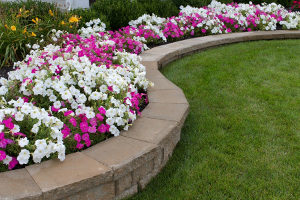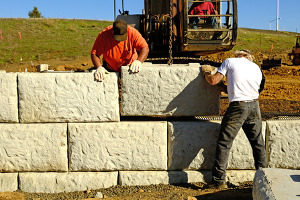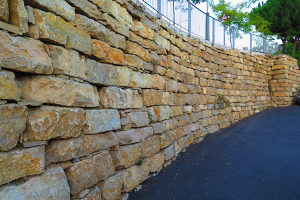A well-built retaining wall adds both functionality and aesthetic value to a property, providing long-lasting soil stabilization, erosion control, and additional landscaping possibilities. However, building a durable retaining wall requires skill, experience, and attention to structural integrity. While a DIY solution may seem tempting, the complexity of the project means that hiring a professional retaining wall contractor is the best approach.
Why It Is Important to Hire a Qualified Contractor
Retaining walls must withstand constant pressure from shifting soil, water runoff, and external forces. If they are not built correctly, they can weaken, crack, or collapse, leading to costly damages. Hiring an experienced contractor ensures that your retaining wall is built with quality materials, follows industry standards and regulations, withstands environmental conditions over time, and enhances the appearance of your landscape.
To help you choose the right contractor, you should ask specific questions before hiring them. These questions will help you gauge their expertise, experience, and reliability in building retaining walls.
1. How Long Have You Been Working in This Industry
Experience matters when hiring a contractor to handle something as structurally important as a retaining wall. The best contractors have been in business for at least five years, providing them with ample experience to handle different types of soil conditions, slopes, and challenges. The longer a contractor has been in the industry, the better they are at problem-solving and offering high-quality craftsmanship.
Ask for specific examples of previous projects that are similar to yours. Contractors should be able to provide before-and-after photographs of their completed retaining walls so you can assess their design and durability.
2. Can You Provide Referrals or Customer Testimonials
Any reputable contractor should have no problem providing multiple references from satisfied clients. Speaking with former customers can give you insight into their work ethic, professionalism, project completion times, overall customer satisfaction, and any unexpected challenges that arose.
If a contractor hesitates or refuses to provide references, that can be a sign that they might not have a solid track record. You can also check online reviews on search engines, review websites, and the Better Business Bureau to gauge their reputation.
3. Can You Show Me a Scaled Landscape Design or Aerial Snapshot of the Project
 A scaled landscape design or aerial blueprint gives you a clear visualization of what your completed retaining wall will look like. This step allows you to plan for potential changes before construction begins, ensure the wall integrates seamlessly with existing outdoor features, and phase out sections of the project if needed in case of budget constraints.
A scaled landscape design or aerial blueprint gives you a clear visualization of what your completed retaining wall will look like. This step allows you to plan for potential changes before construction begins, ensure the wall integrates seamlessly with existing outdoor features, and phase out sections of the project if needed in case of budget constraints.
Having a well-drawn plan also ensures that the contractor follows a structured approach without unnecessary delays or deviations from the agreed-upon design.
4. Are You a Certified Retaining Wall Installer
Certification guarantees that a contractor has undergone professional training in retaining wall construction. There are two industry-recognized certifications to look for:
- Certified Segmental Retaining Wall Installer
- Interlocking Concrete Paver Installer
While certifications are not legally required in all areas, hiring a certified contractor ensures they follow proper engineering principles and safety regulations, stay up to date with the latest construction standards, and offer higher quality work than uncertified builders.
Uncertified contractors may lack structural knowledge, increasing the risk of wall failure due to poor drainage, reinforcement issues, or improper installation techniques.
5. How Much Will the Project Cost
Budget planning is a critical part of installing a retaining wall. The cost depends on multiple factors, including the size and height of the retaining wall, the materials used such as concrete, stone, or brick, the complexity of the terrain and soil conditions, and the labor required to complete the project.
Retaining walls can range from a few hundred to several thousand dollars, depending on these factors. A good contractor will provide a detailed estimated quote upfront, including materials, labor, and potential unforeseen expenses. Asking about costs in advance helps prevent unexpected price increases later in the project.
Additionally, installing a retaining wall is an investment that can enhance property value, prevent soil erosion, and provide a strong return on investment over time.
6. Do You Hire Subcontractors
Some contractors hire subcontractors to help with specific aspects of construction, especially for larger retaining walls. While this is common, it is important to know how much of the work will be handled by the primary contractor versus by outsourced teams.
Questions to ask regarding subcontractors include who will oversee the subcontracted work, what qualifications the subcontractors have, whether hiring additional workers will increase project costs, and how responsibility for quality control is handled.
While subcontractors can speed up the project, having too many can create miscommunication issues and delays. Make sure the contractor has a strategy for managing their workforce efficiently.
7. What Type of Materials Do You Recommend
The quality of your retaining wall depends heavily on the materials used. Ask the contractor for recommendations based on durability, aesthetics, and function. Some popular options include:
Concrete blocks, which are strong, affordable, and easy to install
Natural stone, which is visually appealing but can be more expensive
Brick masonry, which is highly durable and ideal for decorative outdoor spaces
Timber, which is an economical option but prone to rot and pests over time
The right material will vary based on your budget, long-term goals, and property conditions.
8. How Will You Ensure Proper Drainage
Drainage is one of the most important aspects of retaining wall construction. Without proper drainage, water can accumulate behind the wall and create excessive pressure, leading to cracks and eventual failure. Some key drainage solutions include installing drainpipes behind the wall, using gravel backfill to prevent water accumulation, and designing the wall with weep holes to allow water to escape.
Ensure your contractor has a detailed plan for drainage, as a waterlogged retaining wall can collapse and require costly repairs in the future.
Why Choosing the Right Contractor is Important
 Hiring an experienced and qualified contractor to build your retaining wall ensures the structure is built to last, resistant to environmental factors, and visually appealing. Asking these essential questions will help you find a trustworthy professional who can deliver quality workmanship while respecting your budget and timeline.
Hiring an experienced and qualified contractor to build your retaining wall ensures the structure is built to last, resistant to environmental factors, and visually appealing. Asking these essential questions will help you find a trustworthy professional who can deliver quality workmanship while respecting your budget and timeline.
- Ensures compliance with building codes and safety regulations
- Prevents costly mistakes and structural flaws
- Enhances the overall look and functionality of your property
- Provides confidence that the job is done correctly the first time
If you are planning to install a retaining wall, make sure to do your research, ask the right questions, and hire a contractor with the experience and credibility to deliver long-lasting results.
Book Our Trusted Retaining Wall Contractors
If you are planning to build a retaining wall, trust the experienced professionals at Dirt Connections. Our team specializes in designing and installing durable, high-quality retaining walls that enhance both functionality and appearance while providing long-term structural support.
With skilled contractors who have extensive experience, we use premium materials and expert drainage solutions to ensure a project that stands the test of time. Our competitive pricing comes with clear, upfront costs, so you know exactly what to expect. Contact Dirt Connections today to schedule a consultation and start your retaining wall project with confidence.









































